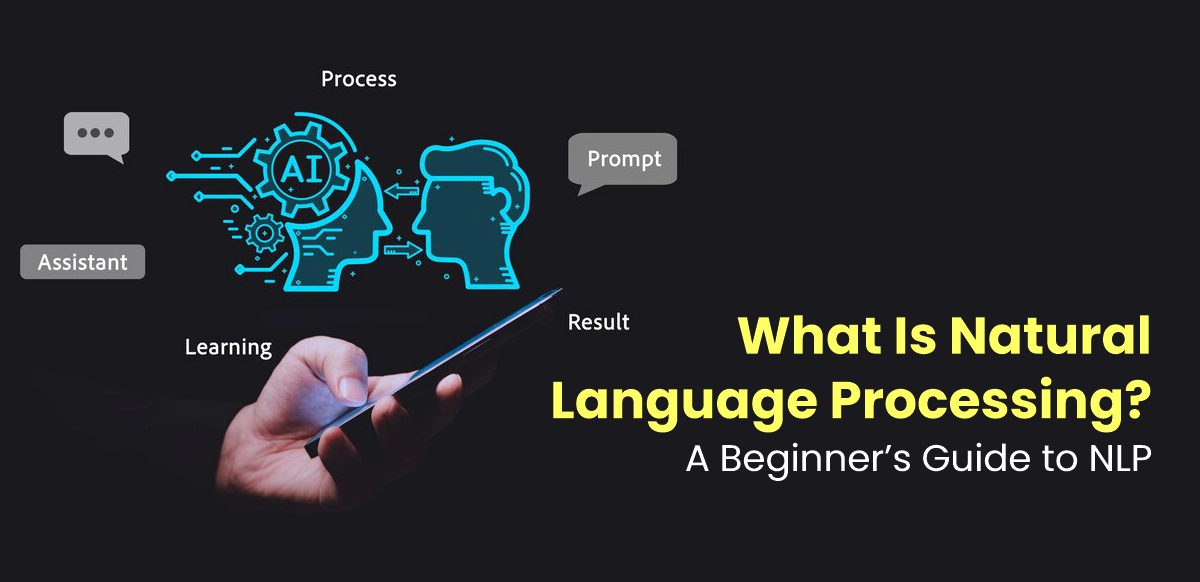Blog > What Is Natural Language Processing? A Beginner’s Guide to NLP
What Is Natural Language Processing? A Beginner’s Guide to NLP
November 23rd, 2023

What Is Natural Language Processing? A Beginner’s Guide to NLP
What Is Natural Language Processing in Artificial Intelligence?
What Are the Benefits of Natural Language Processing in Artificial Intelligence and Machine Learning?
- Human-Computer Interaction Enhancement
- Better Data Understanding
- Sentiment Analysis to Improve User Experience
- Support in Multiple Languages
- Language-Intensive Task Automation
- Big Data Analytics
- Security and Fraud Detection
- Customer Service Simplified
What Is the Significance of Natural Language Processing in Artificial Intelligence Courses in India?
- Increasing the Relevance of the Curriculum
- Encouragement of Practical Application
- Enhancement of Employability
- Linguistic Diversity
- How can beginners start learning NLP?
- What is the role of NLP in the job market?
- Is NLP limited to English, or does it also accommodate other languages?
- How does NLP contribute to AI innovation?
Natural language processing is a vital element of Artificial Intelligence, redefining how machines interpret and respond to human language. It enables computers to read, analyse, and generate human-like work, allowing for seamless communication between humans and machines.
In this blog, we will understand the NPL, its benefits, and other vital information you must know.
What Is Natural Language Processing in Artificial Intelligence?

Natural language processing in artificial intelligence is diverse and transformational. NLP is essential in improving human-computer interactions via apps such as chatbots, virtual assistants, and voice-activated systems such as Siri and Alexa.
Sentiment analysis is a branch of natural language processing. It is widely used to evaluate public sentiment on social media and language translation services. These services include Google Translate, which uses NLP algorithms to generate accurate and coherent translations.
In healthcare, NLP plays a pivotal role by extracting crucial insights from medical texts, aiding in diagnosis and therapy planning. Extending its reach to the financial sector, NLP is harnessed in stock trading for sentiment analysis.
The widespread application of NLP across various industries is reshaping the interactions with AI. It fosters innovation in customer service, information retrieval, and data analysis, showcasing its transformative impact across diverse domains.
Read More : What is Artificial Intelligence?
What Are the Benefits of Natural Language Processing in Artificial Intelligence and Machine Learning?
Integrating natural language processing in artificial intelligence and machine learning systems provides many advantages, improving their capabilities and broadening their applications. Here are some significant benefits.
1. Human-Computer Interaction Enhancement
Natural Language Processing helps understand and respond to human language, allowing humans and AI systems to engage more naturally and intuitively.
2. Better Data Understanding
NLP enables AI models to extract meaning and insights from unstructured text input, increasing the information available for decision-making.
3. Sentiment Analysis to Improve User Experience
The sentiment analysis capabilities of natural language processing enable AI systems to gauge and respond to human emotions, resulting in more personalised and sympathetic interactions.
4. Support in Multiple Languages
Natural language processing enables AI models to process and comprehend various languages, allowing them to adapt to multiple linguistic circumstances and serve a worldwide audience.
5. Language-Intensive Task Automation
Natural language processing improves the productivity of language-intensive operations in various industries by automating tasks such as content summary, language translation, and text production.
6. Big Data Analytics
Natural language processing aids in extracting significant insights from massive amounts of text data, resulting in better decision-making and strategic planning based on thorough analysis.
7. Security and Fraud Detection
Natural language processing aids in discovering patterns of fraudulent activity in financial and cybersecurity applications by analysing textual data, hence strengthening security safeguards.
8. Customer Service Simplified
NLP-powered chatbots and virtual assistants improve customer service by interpreting and responding to user queries, resulting in faster and more accurate resolutions.
https://www.youtube.com/watch?v=rCh1J8J5s0M
What Is the Significance of Natural Language Processing in Artificial Intelligence Courses in India?

The significance of natural language processing in artificial intelligence courses in India is becoming increasingly important, reflecting the country's changing landscape of technological education.
1. Increasing the Relevance of the Curriculum
Integrating natural language processing in artificial intelligence courses ensures that students develop skills that align with market demands, mainly using NLP in various industries.
2. Encouragement of Practical Application
Natural language processing, ranging from chatbots to sentiment analysis, presents students with concrete examples of how to apply theoretical information, developing a deeper understanding.
3. Enhancement of Employability
As more sectors in India implement AI technologies, natural language processing expertise becomes a valuable advantage for job seekers. NLP-infused AI courses prepare students to address the growing demand for competent workers in the developing tech world.
4. Linguistic Diversity
India's linguistic diversity is immense, and natural language processing skills are essential to address the intricacies of various languages and dialects. AI courses emphasising NLP teach students how to create solutions that account for regional linguistic variances.
Read More : The Role of Linguistics in AI
Artificial Intelligence and Machine Learning: The Revolutionary Function of Natural Language Processing
Integrating natural language processing in artificial intelligence and machine learning expands their capabilities by fostering seamless human-computer interactions, enabling smart data analysis, and broadening applications across sectors. Natural language processing is an innovative power, generating a future in which language is a bridge to excellent technology capabilities.
Enrich your understanding and explore the fascinating artificial intelligence and machine learning realm. Contact upGrad Campus and start your NLP journey for a transformative learning experience.
https://www.youtube.com/watch?v=MiacdA5B0nA
FAQs
1. How can beginners start learning NLP?
Beginners can develop a solid programming foundation, study basic linguistic ideas, and explore introductory NLP courses and tutorials.
2. What is the role of NLP in the job market?
NLP skills are in high demand in various businesses, mainly as AI use develops. NLP proficiency improves employability in professions involving data analysis, machine learning, and AI development.
3. Is NLP limited to English, or does it also accommodate other languages?
There is no limitation of NLP to English; it supports many languages. Many NLP models and tools deal with linguistic variation.
4. How does NLP contribute to AI innovation?
NLP encourages study in language processing, which leads to breakthroughs in chatbot technology, language understanding, and creative thinking.
Disclaimer: The success of job placement / interview opportunity depends on various factors including but not limited to the individual's qualifications, experience, and efforts in seeking employment. Our organization makes no guarantees or representations regarding the level or timing of job placement / interview opportunity. Relevant terms and conditions will apply for any guarantee provided by upGrad.






Add a Comment